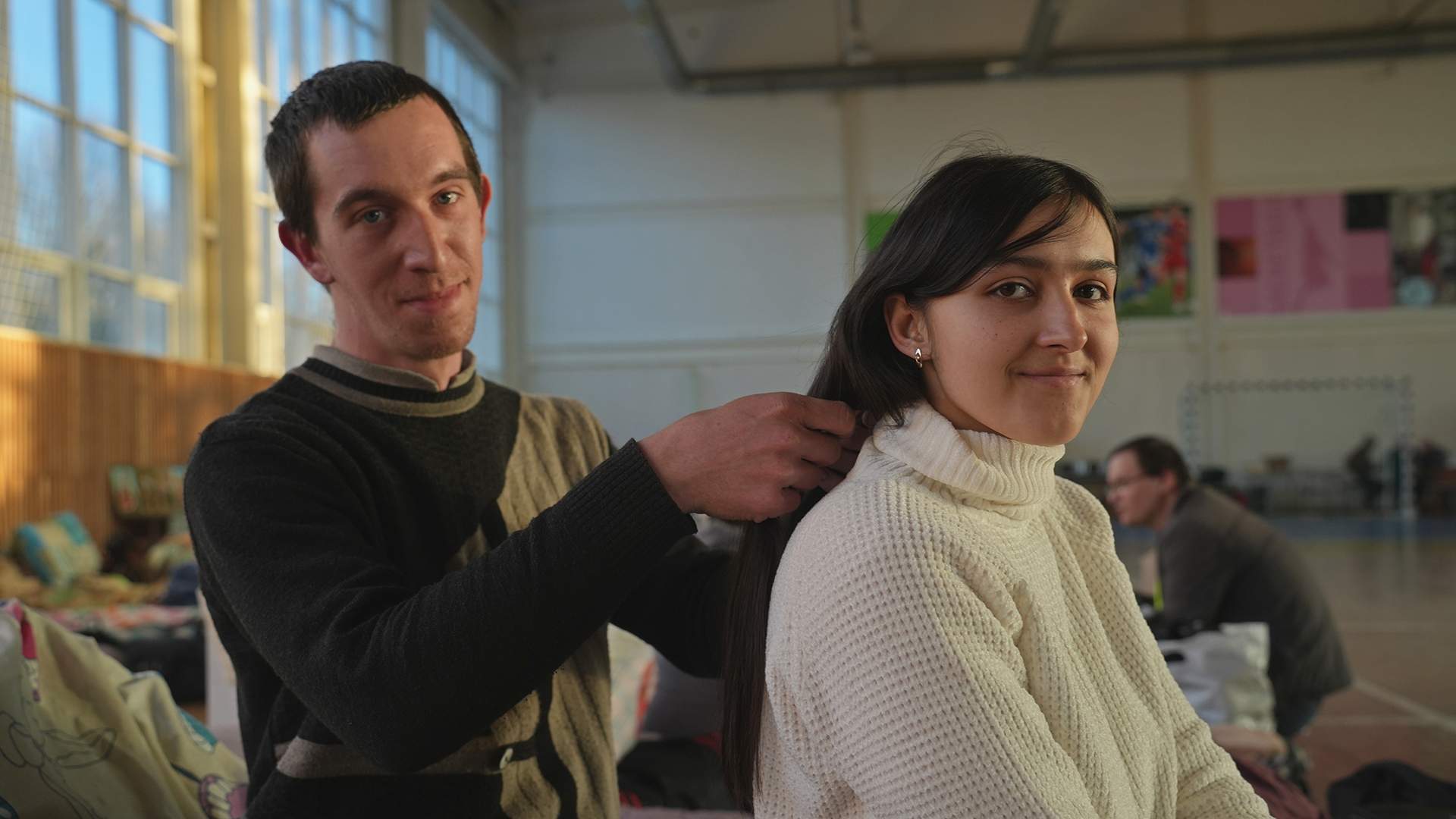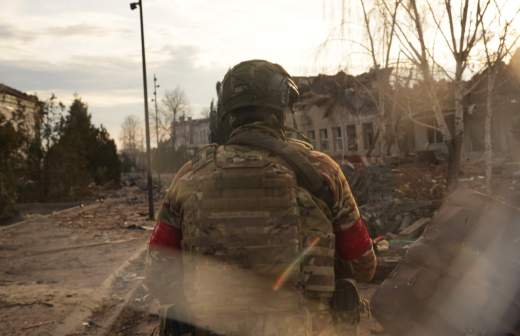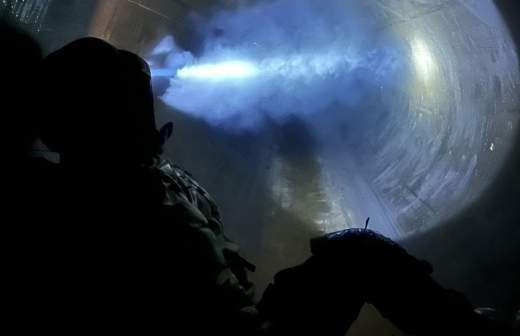"The first and last days were the most difficult"

Passes from the commandant's office, threats with weapons, loss of loved ones, constant fear and painful expectation — these are the familiar realities for citizens of the Sudan after the invasion of the Armed Forces of Ukraine. After the liberation of the city, they are evacuated to temporary accommodation facilities, where they are provided with food, clothing, and help with paperwork and social benefits. To date, more than 500 people have been evacuated from the Sudzha district. A special correspondent of Izvestia visited one of the camps where the evacuees were housed and learned what seven months under occupation was like.
"You are under occupation"
A sports hall in one of the rear villages of the Kursk region, equipped as a temporary accommodation facility. A log with a list of evacuees at the entrance — relatives of the missing call here from morning to night. Folding beds and bedside tables from one football goal to another. Tables and benches lined up in a row are an improvised dining room. Some of the refugees are found and taken away by their relatives after a day or two. Unfortunately, there is no one to come for someone.
73-year-old Valentina Vasilyevna is one of those whom no one met with open arms. My husband and child died a long time ago. My mother stayed, and they traveled together after the Ukrainian Armed Forces attack in their apartment on Oktyabrskaya Street near the Sudzha railway station. But in November, my mother's heart broke. "I did not live to see my 95th birthday. How I tried to persuade her to make it..." the daughter sighs. Valentina Vasilyevna buried her mother in the front garden, right in front of the windows.
On the day of the attack — August 6 — she did not understand anything. I saw our military guys leaving by car. When I went outside, I noticed that there were fewer neighbors. Then there was a strange silence. Two days later, there was a knock on her door.
"I looked through the peephole, and there were people in hard hats," recalls Suzhanka. "I thought it was looters." I shout to them, "I'll call the police now!" And they say, "You're not going anywhere, Grandma. There's no one there. We are the Armed Forces of Ukraine. You are under occupation!"
"We have released you"
Valentina and her mother were left alone in a two-story house with 16 apartments, all the neighbors moved out. The newly formed commandant's office (a military police agency) had to get passes confirming that they were local residents. They gave me a six-month loan. The woman asked: "Are you going to stand here for six months?" They answered her: "Maybe a year!"
There was no gas, light, or water, she says. There was no money. The products were taken from shops gutted by the SS: water, cereals, canned food, crackers. I have heard about crimes against civilians, but I have not seen them with my own eyes. The Ukrainian mobilized soldiers standing nearby were generally not offended, but they warned: "Be careful. There are all kinds!"
I cooked the food on bricks in the yard. I installed a heater in the apartment. One day, she found a battery-powered radio in the ruins, took it with her, and at home, covered with a cotton blanket (so that, according to her, the APU would not catch the signal), listened to the news from her native territory, and then retold it to her mother while she was alive.
I met my release on March 12. I was walking down the street. And then there are the guys with the red armbands. She looked closer and asked: "Are you going far?" They responded, smiling broadly: "Do you know that we have freed you?" She stopped, hugged, and began to cry. I said, "Let's go feed them!" And they said, "No, we still have to go ahead."
"And where will you go..."
Two cots away, there is another woman, 63-year-old Alexandra Ivanovna. Next to it is a box in which a rabbit wiggles its ears.
—Yasha," she says gently, and laughs. "I picked him up at a broken—down pet store. All the animals died there, but he alone, still tiny, survived. He was sitting in a corner waiting for me.
Alexandra Ivanovna stammers a little. She gets confused with words, forgets names, all the time as if she is trying to concentrate and repeats through the word: "And where will you go ..." A smile appears on her face only when she turns to her pet over and over again.
— Yasha, don't be afraid! It's quiet here," she strokes him and puts cabbage leaves on him. "He's used to me. And I can't do anything without him. We went through the hardest time together…
Looters gradually looted everything in her apartment building. They tried to get into her apartment, broke down the door, thinking that there was no one inside. She handed me a hammer and made me hammer it back in. They dragged, he says, anything of value: appliances, furniture, computers. They especially tried to find jewelry, turning everything upside down. The entire fleet in the city was taken out, from school buses to tractors. Non-ferrous metals were cut.
Her daughter Natalia lives in Kursk. They saw each other today, seven months later. At first, for some reason, they didn't even recognize each other. In the near future, Alexandra Ivanovna will finally be able to move into normal housing, where there is heat, light, and water.
—And where will you go..." she repeats, once again turning to her rabbit.
"Our hope and support"
The Belobrov family has four children. The eldest, Bogdan, is 24 years old, the youngest, Anna, is 13. Father Victor worked as a locksmith in the Heating Networks, mother Sveta was an assistant kindergarten teacher. Perhaps they would have managed to evacuate at the very beginning, but on the night of August 6, the eldest son, also a locksmith, went on shift. And on the 7th, the highway from Sudzha was already cut, in front of the White-browed APU, a car in which a family with a child was traveling was shot. On the 9th, armored vehicles with triangles on the sides (the sign of the Ukrainian army) entered the city. At the same time, soldiers with weapons went through apartments and basements to look for the Russian military.
"The first weeks of the occupation were the most difficult, when we had to adapt to new conditions and improve our daily lives," says Bogdan. — And the last days, when there was shelling and fighting. Fortunately, everything happened quickly. On the eve of March 12, we saw a group of seven Ukrainian soldiers retreating on our street, then three more. They were sullen and in a hurry. And soon our five stormtroopers came in. As soon as the opportunity presented itself, all of us, except Dad, evacuated. He decided to leave on his own in his car and bring his things.
According to the Belobrovs, the militants tried to take this car away from them more than once. They came, asked, demanded, but, fearing complaints to the commandant's office, they retreated. The most unpleasant episode occurred when another group arrived with machine guns and began threatening to shoot. After not receiving the keys to the car, they promised to return. But they were never seen again.
— On our outskirts, in the area of the railway station, it was even more or less quiet, - says Sveta's mother. — Yes, and the commandant's office itself was nearby. And the further to the border, the harder it got—that's where the mercenaries were based. In Goncharovka, they say, there was no life for the civilian population at all.
And he adds, pointing to Bogdan:
— My son has matured in these six months. He used to be quiet and modest, but now he's completely different, responsible for everyone! He and his father were our hope and support.
Two days after the evacuation of his children and wife from Suji, Papa Victor, having packed up his things, as well as locksmith tools (he would have to start life from scratch in a new place) and capturing the cat, waited for a short "window" when the enemy FPV drones fell silent for a while due to the wind, kicked the car out of the garage and took off to their own people. I drove without a windshield, at top speed, to the Largest Soldier's (25 km), fearing attacks from the sky. I got there without incident, having passed the last test. Currently, the Belobrov family has been reunited.
Переведено сервисом «Яндекс Переводчик»








